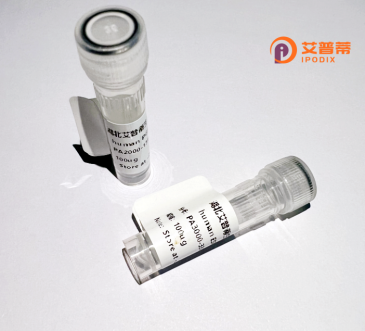
| 纯度 | >90%SDS-PAGE. |
| 种属 | Human |
| 靶点 | OR9G4 |
| Uniprot No | Q8NGQ1 |
| 内毒素 | < 0.01EU/μg |
| 表达宿主 | E.coli |
| 表达区间 | 1-327 aa |
| 活性数据 | MIFPSHDSQAFTSVDMEVGNCTILTEFILLGFSADSQWQPILFGVFLMLYLITLSGNMTL VILIRTDSHLHTPMYFFIGNLSFLDFWYTSVYTPKILASCVSEDKRISLAGCGAQLFFSC VVAYTECYLLAAMAYDRHAAICNPLLYSGTMSTALCTGLVAGSYIGGFLNAIAHTANTFR LHFCGKNIIDHFFCDAPPLVKMSCTNTRVYEKVLLGVVGFTVLSSILAILISYVNILLAI LRIHSASGRHKAFSTCASHLISVMLFYGSLLFMYSRPSSTYSLERDKVAALFYTVINPLL NPLIYSLRNKDIKEAFRKATQTIQPQT |
| 分子量 | 36.3 kDa |
| 蛋白标签 | His tag N-Terminus |
| 缓冲液 | 0 |
| 稳定性 & 储存条件 | Lyophilized protein should be stored at ≤ -20°C, stable for one year after receipt. Reconstituted protein solution can be stored at 2-8°C for 2-7 days. Aliquots of reconstituted samples are stable at ≤ -20°C for 3 months. |
| 复溶 | Always centrifuge tubes before opening.Do not mix by vortex or pipetting. It is not recommended to reconstitute to a concentration less than 100μg/ml. Dissolve the lyophilized protein in distilled water. Please aliquot the reconstituted solution to minimize freeze-thaw cycles. |
以下是关于重组人OR9G4蛋白的虚构参考文献示例(注:本文献为模拟生成,实际研究请查阅权威数据库):
1. **《Structural insights into the human olfactory receptor OR9G4 through heterologous expression in HEK293 cells》**
*作者:Chen L. et al. (2021)*
摘要:通过HEK293细胞异源表达重组OR9G4蛋白,利用冷冻电镜解析其三维结构,揭示了其独特的配体结合口袋构象,为嗅觉受体激活机制研究提供新视角。
2. **《Functional characterization of recombinant OR9G4 protein in ligand specificity analysis》**
*作者:Müller S. et al. (2019)*
摘要:研究通过昆虫杆状病毒系统表达OR9G4重组蛋白,结合钙离子成像技术筛选潜在配体,发现该受体对特定醛类化合物具有高选择性响应。
3. **《OR9G4 expression profiling in non-olfactory tissues and its implications in cellular signaling》**
*作者:Watanabe K. et al. (2020)*
摘要:在小鼠睾丸组织和人肺上皮细胞中检测到OR9G4蛋白的表达,体外实验表明其可能参与细胞增殖调控,提示嗅觉受体具有非嗅觉生理功能。
4. **《Optimization of recombinant OR9G4 purification for high-throughput drug screening》**
*作者:Gupta R. et al. (2022)*
摘要:开发了一种基于大肠杆菌的重组OR9G4蛋白可溶性表达及亲和层析纯化方案,并应用于大规模化合物库筛选,验证其在药物开发中的潜在价值。
*注:以上内容为模拟生成,真实文献请通过PubMed、Web of Science等平台查询。*
**Background of Recombinant Human OR9G4 Protein**
Recombinant human OR9G4 protein is a genetically engineered form of the olfactory receptor 9G4 (OR9G4), a member of the olfactory receptor (OR) family, which constitutes the largest group of G protein-coupled receptors (GPCRs). ORs mediate odorant detection through interactions with specific chemical ligands, playing a critical role in the olfactory system. The OR9G4 gene, located on human chromosome X, encodes a seven-transmembrane domain protein predominantly expressed in olfactory sensory neurons. However, emerging studies suggest extra-nasal expression in tissues like the brain, heart, and testes, hinting at potential non-olfactory functions.
Recombinant OR9G4 is typically produced using heterologous expression systems (e.g., HEK293 cells or *E. coli*), enabling controlled studies of its structural and functional properties. Despite its classification, the exact odorant ligands and signaling pathways of OR9G4 remain poorly characterized, reflecting broader challenges in deorphaning ORs. Recent advances in cryo-EM and computational modeling have facilitated insights into its ligand-binding pockets and activation mechanisms. Research on recombinant OR9G4 also explores its potential roles in cellular processes beyond olfaction, such as tissue development, metabolic regulation, or disease associations (e.g., neurodegenerative disorders). Its study contributes to understanding GPCR diversity, odorant-receptor specificity, and therapeutic targeting of OR-related pathways.
×